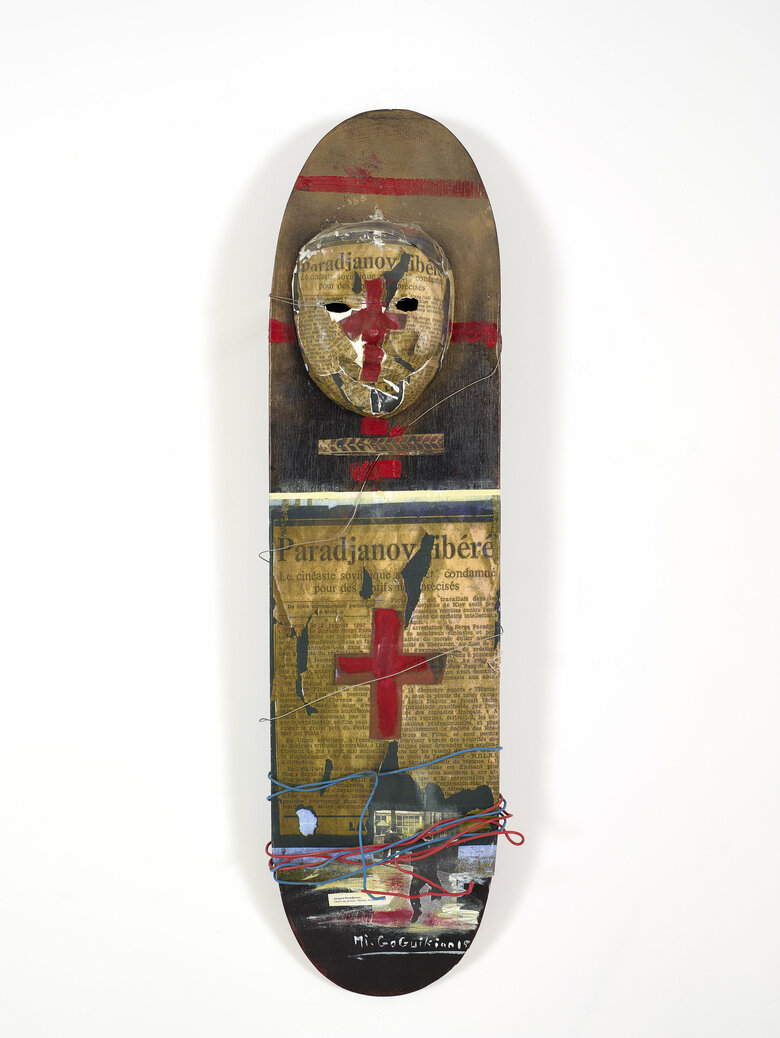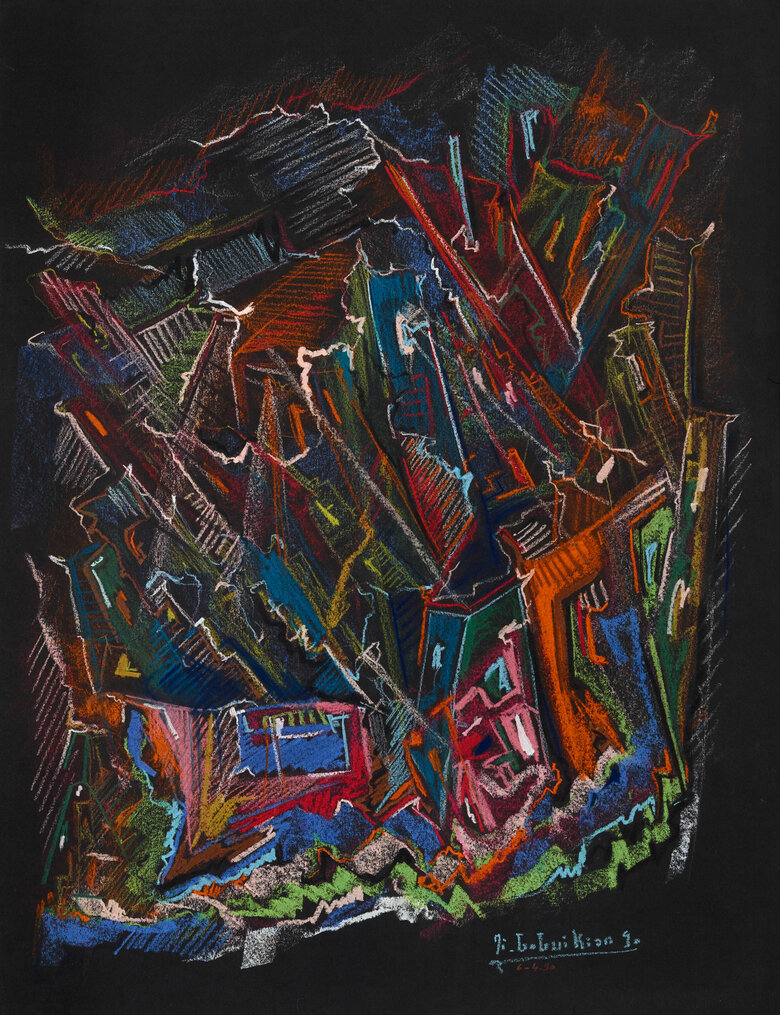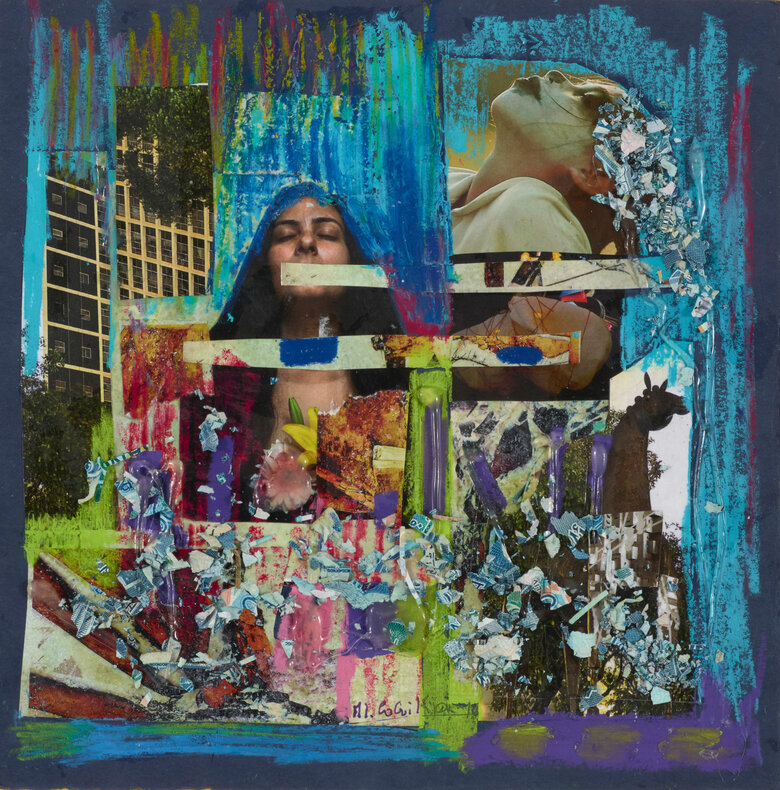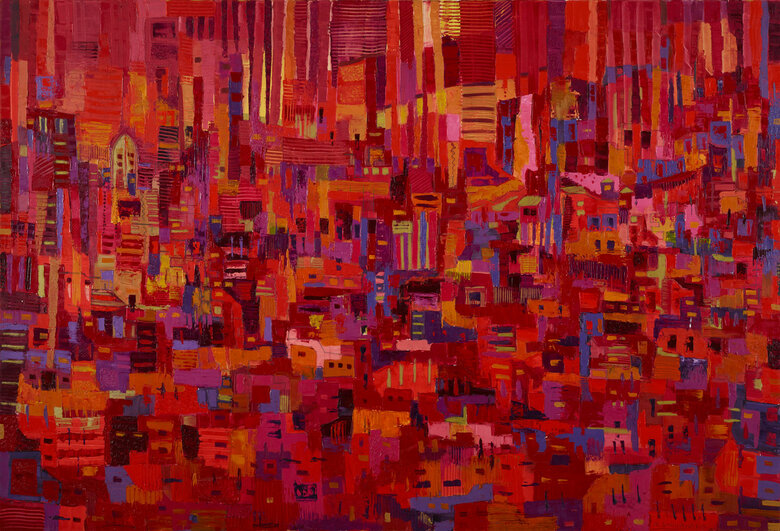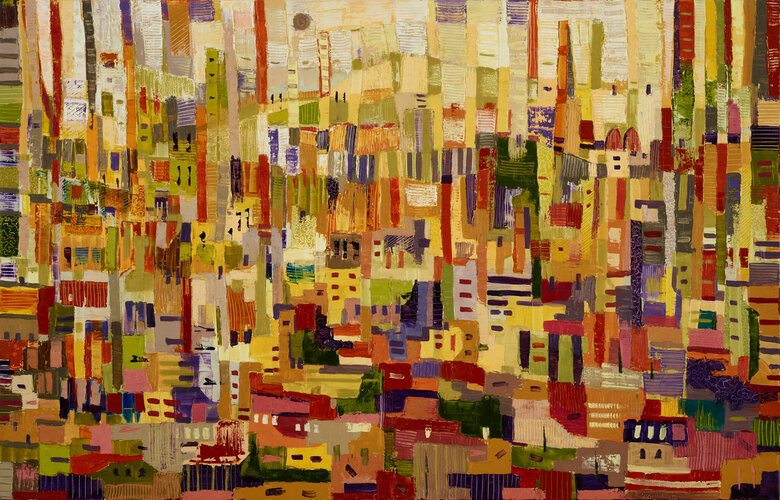Mireille Goguikian is a Lebanese-Armenian painter born in Beirut, in 1964. She is known for her colorful semi-abstract paintings of the city. Her work encompasses pastel drawings, oil paintings,...
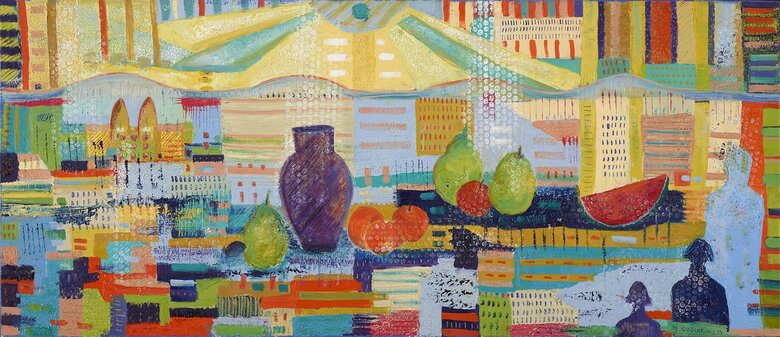


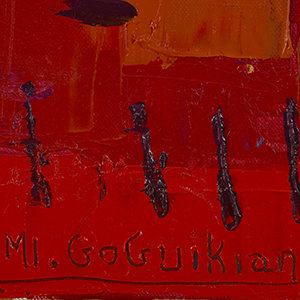

Mireille Goguikian is a Lebanese-Armenian painter born in Beirut, in 1964. She is known for her colorful semi-abstract paintings of the city. Her work encompasses pastel drawings, oil paintings,...
Mireille Goguikian is a Lebanese-Armenian painter born in Beirut, in 1964. She is known for her colorful semi-abstract paintings of the city. Her work encompasses pastel drawings, oil paintings, and mixed-media works. Her practice is particularly influenced by her dreams about Beirut – including the violent events of the Lebanese civil war and the Beirut port explosion of 2020 – and her strong faith in God. Goguikian's relationship with art emerged from a period of confusion about what to do with her life. Upon the suggestion of her mother's uncle, she took some summer drawing classes with Tony Massad, and afterward, was accepted into the Interior Architecture Program at the Lebanese Academy of Fine Arts (ALBA). Encouraged by her professor Nicole Harfouche, she eventually switched to the Arts Plastiques 1 .
During her educational years, she was taught by the Armenian/Lebanese painter Paul Guiragossian. His teaching gave Goguikian the opportunity to improve her painting skills and gain knowledge of art history. His reference to Renoir in relation to the colors in a nude painting by Goguikian pushed her to delve into art books and educate herself. In her final years, she achieved her first recognitions. In 1987, she participated in the Béchir Gemayel competition with the topic of L'artisanat libanais, launched by the school. She won the 2 nd Prize for her work—a pastel drawing of three women sitting on their knees weaving a tapestry. In 1988, she graduated from ALBA and won the Samir Tabet Prize, rewarding her graduation project 2 .
In 1990, Goguikian went to Iesi in Ancona, Italy, for three months to learn Italian. During this period, she became fascinated by Italian architecture, particularly the arcades—an element that has become recurrent in Gogukian's paintings. Later on the same year she moved to Paris where she remained until 1995. During these years she attended the atelier libre at Académie de la Grande Chaumiere and got married to the architect Charly Dabbaghian (1991). She also came in contact with the local Armenian community. Since then, discovering her roots through art has become a recurrent practice in her work. 3
Alongside her career as a painter, Goguikian has been engaged in educational activities in various institutions in Lebanon. In the late eighties, she taught at the Young Women's Christian Association (YWCA) and at ALBA. Later on, she taught at the Toros Roslin Academy. Currently, she is teaching interior design at the Saints-Coeurs Technical College in Bauchrieh, Lebanon. 4 .
Throughout all of Goguikian's work, her background in architecture is perceptible. Her work translates specific circumstances and the emotions that come along through symbolism and the geometry of the city. In the early years of her career, between 1988 and 1990, Goguikian painted Beirut destroyed during the Civil War (1975-1990) from a very close point of view. Multi-point perspectives and linear forms that extend and drip as if beyond the painting’s composition, shaped the images of a living room, as in Seisme, 1988, part of the collection of the artist 5 and a tunnel in fire, as in Tunnel enflammé, 1987, which was sold to a private collection. A zoomed in perspective and overlapping elements constitute the images of a car crash, as in Le monde brisé, 1987, and a bedroom in Blu vision, 1989, both being part of the collection of the artist. These images are characterized by a strong dramatic tension.
Beirut remains her main reference, her inspiration, but from the start of the 1990s, the city is painted from a distant point of view and emerges as a tight net of buildings. It loses the illusive and dramatic traits, to enter a more graphic aesthetic. Still, by adopting curvilinear shapes, Goguikian adds dynamism to her cityscape depictions. In the context of the Lebanese civil war, she drew falling buildings, with vibrant colored pastels on black cardboard. One of these drawings, Untitled, 1990, is currently part of the Ramzi and Saeda Dalloul Art Foundation collection. The visual effect of these artworks is an undistinguished mass that convey a feeling of oppression and chaos.
In the 2000s, Goguikian started to develop the aesthetic she became known for. By using oil paint and a palette knife, she transformed her cities into unfolded landscapes. The paint is spread either vertically or horizontally, creating a sort of grid. Curved lines are almost completely absent. Furthermore, the scratches made with the spatula and the uneven distribution of the color mass give the paintings a tactile texture. The color composition and symbolic elements emerge in this period as pivotal in composing the images. Goguikian either combines different colors in a specific tone, as seen in Melodie de Couleurs, 2013, part of the Ramzi and Saeda Dalloul Art Foundation (DAF) collection, or she goes monochromatic, as, for example, in Peperoni, 2014, also part of the DAF collection, where she plays with different shades of red. In Melodie de Couleurs, 2013, she adopts primary red, blue and yellow colors, and generates secondary greens, ornages and violets within the same composition. However yellow is the prevalent color, giving a warm tone to the painting. Yellow has both a spiritual and formal dimension. It represents light for Gogukian, both in the physical sense and in the sense of faith. As a remark of her faith, she adds a small sun, which, for her, represents rebirth in all her paintings. In Peperoni, 2014, the red color is used by Goguikian to symbolize the bloodshed during the Armenian genocide. 6 .
Goguikian's choice of technique goes beyond the aesthetic of the image; in fact, the act of painting is, for her, a way to elaborate on emotions. In her words: “It is like therapy.” 7 As she explained: “Every inspiration is a ride, a souvenir that is engraved in my memory and that I translate through my imagination as a dream.” 8 She never makes sketches or preparatory studies. She puts her feelings on the canvas while she is experiencing them. She describes moments when she is very happy or very sad as the most productive ones 9 . On the occasion of the explosion at Beirut port on the 4th of August 2020, she painted a series of images under the name of Éclats de Beirut, 2021, part of the collection of the artist 10 . The seven paintings were exhibited at the XIII Biennale in Florence and earned her the Jury Prize 11 . In these images, Goguikian deconstructs and recomposes the various facets of the city by mixing and overlapping small surfaces of colors, conveying the state of chaos.
Goguikian's numerous national and international exhibitions, her membership in associations showcase her deep engagement in the art world and her eagerness to use art as a communication tool that conveys shared emotional states, thus connecting human beings. Goguikian’s body of work offers a sensorial experience of the city through it shapes, colors and light. Her pictorial process is guided by her dreams about Beirut, the violent events of her time, and her strong faith in God. The strong symbolism invites the observer to understand the paintings through the feelings and connotations they might evoke. Goguikian’s use of different materials like oilpaint, pastel, chalk, glue and meshes demonstrates an experimental approach to art-making. Throughout her career, Goguikian has shown a perpetual engagement in processing emotions related to historical events through the production of art.
Edited by Wafa Roz & Elsie Labban
References
Artist of Beirut. “Mireille Goguikian.” Youtube video. Accessed October 16, 2023. https://www.artistsofbeirut.com
Goguikian, Mireille (@mireille.goguikian), “We will never forget. Never forgive. Until justice is served,” Instagram photo, August 4, 2023, www.instagram.com
Gogukian,Mireille. “Interview with Mireille Gogukian.” Interview by Maria Lunderskov. October 26, 2023.
Keuchkerian, Karine. “This Is How Lebanese Artists Are Commemorating Beirut Blast’s 2nd Anniversary.” The961, August 4, 2022. https://www.the961.com
M.A.D.S Gallery. “Mireille Goguikian Painter Bio.” Accessed October 14, 2023. www.madsgallery.art
1 Mireille Gogukian, “Interview with Mireille Gogukian,” interview by Maria Lunderskov, October 26, 2023
2 Mireille Gogukian, “Interview with Mireille Gogukian,” interview by Maria Lunderskov, October 26, 2023
3 Mireille Gogukian, “Interview with Mireille Gogukian,” interview by Maria Lunderskov, October 26, 2023
4 Mireille Gogukian, “Interview with Mireille Gogukian,” interview by Maria Lunderskov, October 26, 2023
5 refer to DAF for visual inquiry
6 Mireille Gogukian, “Interview with Mireille Gogukian,” interview by Maria Lunderskov, October 26, 2023
7 Mireille Gogukian, “Interview with Mireille Gogukian,” interview by Maria Lunderskov, October 26, 2023
8 “Mireille Goguikian,” Artist of Beirut, Youtube video, accessed October 16, 2023, www.artistsofbeirut.com
9 Mireille Gogukian, “Interview with Mireille Gogukian,” interview by Maria Lunderskov, October 26, 2023
10 Mireille Goguikian (@mireille.goguikian), “We will never forget. Never forgive. Until justice is served,” Instagram photo, August 4, 2023, www.instagram.com/p/
11 “Mireille Goguikian Painter Bio,” M.A.D.S. Gallery, accessed October 14, 2023, www.madsgallery.art/it
12 Mireille Gogukian, “Interview with Mireille Gogukian,” interview by Maria Lunderskov, October 26, 2023
13 Mireille Gogukian, “Interview with Mireille Gogukian,” interview by Maria Lunderskov, October 26, 2023
14 Mireille Gogukian, “Interview with Mireille Gogukian,” interview by Maria Lunderskov, October 26, 2023
15 Mireille Goguikian (@mireille.goguikian), “We will never forget. Never forgive. Until justice is served,” Instagram photo, August 4, 2023, www.instagram.com
16 Karine Keuchkerian, “This Is How Lebanese Artists Are Commemorating Beirut Blast’s 2nd Anniversary,” the961, August 4, 2022, www.the961.com
Selected Solo Exhibitions
Shades & Shadows, Kalim Art Space, Beirut, Lebanon
Retrospective - 35 years of Artistic Creation, The Modern Art Museum, Yerevan, Armenia
Voyage de l'âme, KAF Contemporary Art Gallery, Beirut, Lebanon
Murmures Chromatiques, Exode Art Gallery, Beirut, Lebanon
Au-delà du rêve, Hamazkayin Lucy Tutunjian Art Gallery, Beirut, Lebanon
Racine Carrée, Hamazkayin Lucy Tutunjian Art Gallery, Beirut, Lebanon
Haigazian University, Beirut, Lebanon
Atelier Georges Khairallah, Mtein, Lebanon
Mireille GOGUIKIAN, Hamazkayin Lucy Tutunjian Art Gallery, Beirut, Lebanon
Gallery Zaman, Beirut, Lebanon
Mireille GOGUIKIAN, Balamand University, Tripoli, Lebanon
MIREILLE GOGUIKIAN DABBAGHIAN, Noah's Art Art Gallery, Zalka, Lebanon
Artuel - Salon Biffies, Beirut Hall, Beirut, Lebanon
MIREILLE GOGUIKIAN DABBAGHIAN, L'auberge de Faqra, Faqra, Lebanon
Centre Alec Manouguian – Union Générale Arménienne de Bienfaisance (UGAB), Paris, France
Retour aux Sources, Gallery Ahskal, Maameltein, Jounieh, Lebanon
Al-Sayed Gallery, Damascus, Syria
Selected Group Exhibitions
UNTITLED Abstraction, Dalloul Art Foundation, Beirut, Lebanon
Daydreams: An Exhibition by Artists of Beirut Initiative, Arthaus Beirut, Beirut, Lebanon
Au-delà du rêve, Hamazkayin Art Gallery, Beirut, Lebanon
4th International Art Biennale Barcelona, Bienal de Arte Barcelona, Barcelona, Spain
InterContinental Phoenicia Hotel, Beirut, Lebanon
Rebirth of a Nation, Beirut Exhibition Center, Beirut, Lebanon
Untitled, Hamazkayin Lucy Tutunjian Art Gallery, Beirut, Lebanon
Fondation Goguikian, Beirut, Lebanon
Haigazian University, Beirut, Lebanon
Villa Moda, Kuwait City, Kuwait
Intercontinental Mzar Hotel, Faraya, Lebanon
Bronte Gallery, The Ritz Hotel, Doha, Qatar
Espace Cézanne, Paris, France
Les artistes arméniens: 50 ans au Liban, Rochane Art Gallery, Beirut, Lebanon
Noah’s Ark Gallery, Beirut, Lebanon
Salon de la Peinture, Beirut, Lebanon
Maison d'Arménie, Paris, France
Institut du Monde Arabe, Paris, France
Centre Hamazkayin, Beirut, Lebanon
Escalier de l'Art, Beirut, Lebanon
Affiliations & Memberships
Syndicat des artistes et sculpteurs Libanais, Beirut, Lebanon
Association of Lebanese Painters and Sculptors – LAAPS, Lebanon
Member of Japan Contemporary Art Association – JCAA, Japan
Member of the National Federation of French Culture
Member of The Salon d’Automne, Paris, France
Association of Armenian Artists of France – APAF, France
Awards and Honros
The Jury Prize at the XIII Biennale in Florence, Florence, Italy
The Special Prize at the 18th ARTEX, London, United Kingdom
The First Prize Samir Tabet Award, Beirut, Lebanon
The 2nd Prize of Bachir Gemayel Award, Beirut, Lebanon
Collections
Ramzi and Saeda Dalloul Art Foundation, Beirut, Lebanon
Hamazkayin Lucy Tutunjian Art Gallery, Beirut, Lebanon
The Museum of the Orthodox Academy of Crete, OAC
The Museum of the Catholicosate of Cilicia, Antelias, Lebanon
The Mtein Museum of Arts, Mtein, Lebanon
The Syrian Ministry of Culture, Damascus, Syria
The Modern Museum of Contemporary Arts in Yérevan, Yerevan, Armenia
The Town Hall of Noisy le Grand, Paris, France
ARRA ARTE Gallery, Macerata, Italy
Join us in our endless discovery of modern and contemporary Arab art
Get updates from DAF
Follow Artists
Save your favourite Artworks
Share your perspectives on Artworks
Be part of our community
It's Free!
We value your privacy
TermsCookiesPrivacy Policies
Get updates from DAF
Follow Artists
Save your favourite Artworks
Share your perspectives on Artworks
Be part of our community
It's Free!
We value your privacy
TermsCookiesPrivacy Policies
Get updates from DAF
Follow Artists
Save your favourite Artworks
Share your perspectives on Artworks
Be part of our community
It's Free!
We value your privacy
TermsCookiesPrivacy Policies
If you have entered your email to become a member of the Dalloul Art Foundation, please click the button below to confirm your email and agree to our Terms, Cookie & Privacy policies.
We value your privacy, see how
Get updates from DAF
Follow Artists
Save your favourite Artworks
Share your perspectives on Artworks
Be part of our community
It's Free!
We value your privacy
TermsCookiesPrivacy Policies
